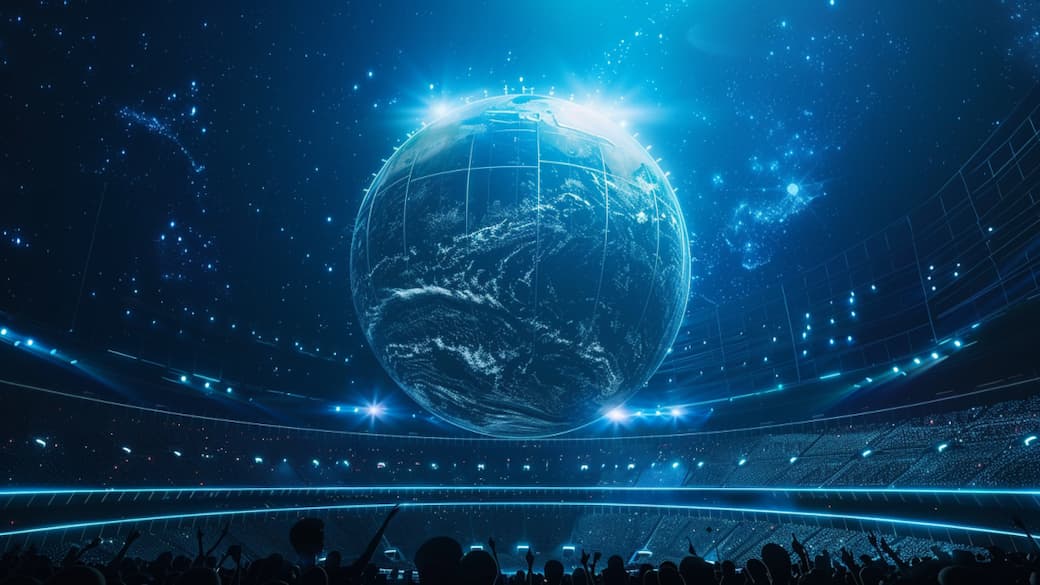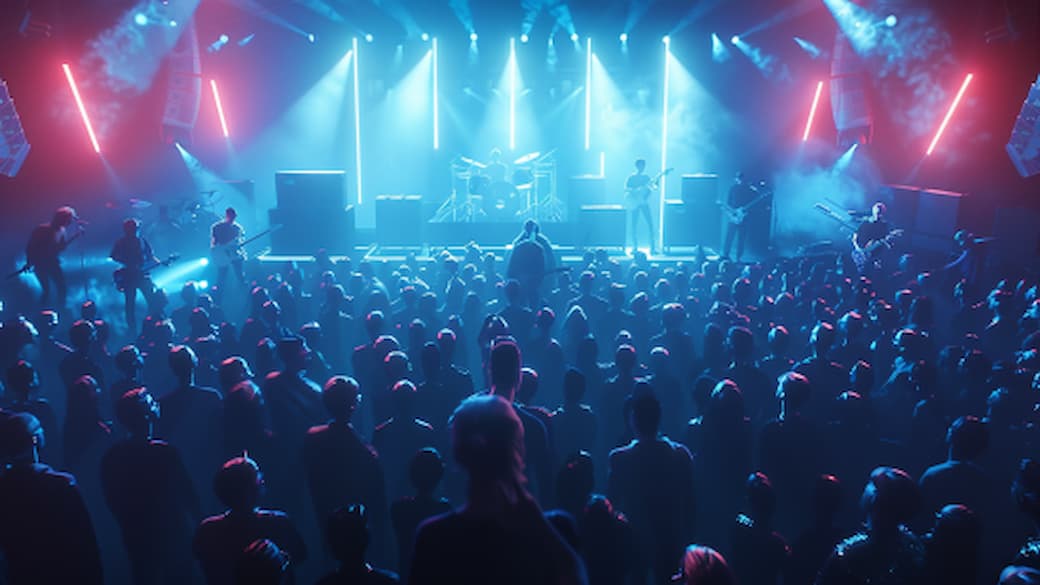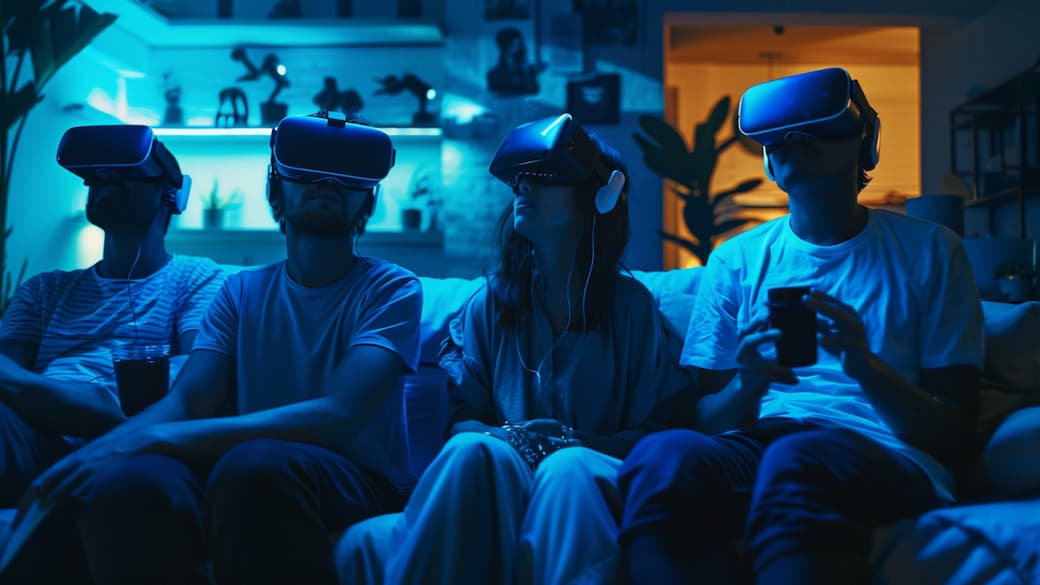
VR and Music Experience: Climate and Accessibility
Content
VR is good for the climate
This ByteFM Show is presented by Sophia Fischer. Interviewees:
-
Christoph Spinger, VR-Nerds
-
Martin Rieger, VRTonung
-
Michaela Pňačeková, Symphony of Noice
Climate and accessibility does not only mean the climate at home or at a concert but actually the climate in the global sense. I was at the music event “M for Montreal” recently and there was quite a serious discussion about climate change. Artists are also worried about the footprint they leave behind and are keen to travel CO2-neutral. At the latest here, some concert friends and VR music experience lovers should also pay attention because Martin says:
“Artists travel around an awful lot and are forced to do so for concerts all over the planet. So what if instead of lots of small concerts, you just have one big concert, which is for example broadcasted in VR or even entirely digital? Also, you could make use of more than the full space, let’s say we’re in a stadium where maybe 100,000 people can fit in. In VR you could virtually allow access for many more people. That means you could sell more tickets than there are people who could fit in that venue.” Now play Coldplay – Paradise
With VR concerts, attendees can enjoy immersive performances from anywhere in the world, whether at home, in a theater, or at locations equipped with VR headsets. Access is possible through various devices, such as VR headsets, AR glasses, or wearable haptic devices, making participation more flexible and inclusive.
>Yes, well, but nevertheless the concert industry rubs its greedy hands warmly. “What, more people want to stand on the catwalk of the Rolling Stones? Please, come in, 100 million euros more for us. “
The benefits of VR concerts include increased accessibility for audiences who may not be able to travel, as well as unique opportunities for artists to reach global fans and create new interactive experiences.
Click here to read about VR concerts.

Accessible concert experience for everybody
Moroever, one must still say that such a technique can also have an inclusive aspect, Martin also emphasizes:
“Not everybody can leave their house without further ado, that’s where you’re already with the topic of inclusion. VR makes music concerts accessible to people whose visits are no problem for us. VR concerts engage people who might otherwise be excluded from live music events, allowing them to actively participate and connect with others. Isolation is one of the biggest cons I hear about VR, but especially in the future, SocialVR will become a much bigger issue and more people can participate than ever before.”
In addition, if one assumes that VR will become really suitable for the masses and thus more affordable, users who are not able to afford tickets, travel and maybe even overnight stays all the time could go to concerts now. Besides that, you would be able to go to shows that you might not be able to access in the real world. Like big awards, the Grammys for example, but also festivals far away or very exclusive VR Musik experiences in an intimate atmosphere. For such events you have to pay a lot of money, besides the astronomical ticket prices, to get there. With VR maybe no problem anymore, as users are now experiencing music in new, immersive ways that make these events more accessible and engaging. And, nobody falls into your tent, drunk as a skunk during a world music festival.

Music creation and innovation in virtual reality
Virtual reality is rapidly transforming the music industry, opening up a world of creative possibilities for both artists and fans. No longer limited by the physical constraints of traditional venues or expensive studio equipment, musicians are now harnessing the power of virtual reality technology to create, perform, and share their music in ways that were once unimaginable.
With platforms like HTC Vive and Oculus Rift, music creation has become an immersive, interactive adventure. Artists can step into a virtual studio, sculpting sound in three dimensions, experimenting with new genres, and collaborating with others across the globe—all without ever leaving their homes. These innovative tools are democratizing music production, giving musicians of all backgrounds the ability to produce crystal clear tracks and experiment with their creativity, regardless of access to high-end studios or equipment.
But the revolution doesn’t stop at music creation. Virtual reality concerts are redefining the live music experience. Fans can now attend virtual concerts from anywhere in the world, feeling as if they’re standing front row at a live performance by their favorite artist. The immersive nature of these VR experiences means listeners can interact with the music, the performers, and even other fans, blurring the lines between audience and artist. Whether it’s a massive virtual festival or an intimate performance in a digital lounge, the possibilities for unique musical experiences are endless.
For the music industry, this wave of innovation brings exciting new opportunities. Virtual concerts and interactive music experiences offer fresh ways for artists to connect with their audiences and generate revenue, while also making live music more accessible to fans who might not be able to attend traditional concerts. Companies are already exploring the potential of these technologies, investing in platforms and tools that make it easier for musicians to create, perform, and share their work in virtual worlds.
Looking ahead, the future of music in virtual reality is bright. As technology continues to evolve—powered by advances in artificial intelligence and interactive design—we can expect even more groundbreaking ways to experience music. From AI-powered music creation tools to fully immersive, interactive live performances, the next wave of musical experiences will transport fans to new worlds and redefine what it means to connect with music.
In this new era, virtual reality is not just a tool for entertainment—it’s a platform for creativity, connection, and innovation. Whether you’re an artist looking to push the boundaries of your sound, or a fan eager to experience your favorite artists in a whole new way, the future of music is virtual, interactive, and full of potential.

Virtual or not, which reality is better?
Sure, you can go to music shows without people who jostle you, but don’t you lose a significant part of what makes up a concert like this? Escape, standing alone in the living room, not the feelings, the buzzing of the bass in the chest, the joyful glowing heat, all expectant around a standing around, the smell of ecstasy lost? I have already experienced how sweat dripped from the ceiling, so wild was what happened on and in front of the stage. You don’t have to like it now, but a concert is a multi-sensory stimulating experience, isn’t it? In VR concerts, however, technology can help attendees feel connected and emotionally engaged, even in a virtual environment, enhancing the sense of social presence and immersion. But maybe you don’t have to see it all so black and white, rather both, like Christoph Spinger.
“Some people can’t go to concerts or something similar for health reasons. I can give them the opportunity to come but it won’t replace the real experience in the near future. Maybe there are people who like VR more because they don’t have to put up with people at the moment. But for a lot of people, I think that’s just part of having a sense of community, and I just can’t convey that as well in video games as I can in real life.”
Be updated about unforeseen possibilities
The peaceful coexistence of virtual and real-world is desirable, Martin also thinks.
“I think you can serve both target groups well with this. The people who want to listen to music on the side and the people who want to listen to like VR music experience in a very concentrated way and close their eyes. But I think there are also people who want to give the music the next kick and I think VR is a good medium to make this immersion into music a real experience.”
The form of VR music experiences—whether interactive games, 360-degree videos, or stylized environments—shapes how users engage and immerse themselves in music. In virtual environments, listening becomes an active and immersive experience, allowing fans to engage with music in new and meaningful ways. Ultimately, VR music experiences can take fans on a unique journey, transporting them to new musical worlds and adventures.